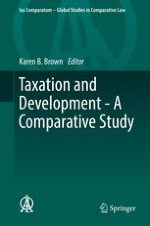Abstract
Although Japan taxes the income of its residents on a worldwide basis, one territorial feature of its regime is the participation exemption. This regime exempts from tax 95 % of dividends paid by a foreign subsidiary to a Japanese parent corporation. Japan closely monitors tax haven activities by strengthening CFC legislation, transfer pricing regulations, and thin capitalization rules. Japan has concluded tax sparing agreements in its bilateral treaties with developing countries, including those with Indonesia, Sri Lanka, Zambia, Thailand, China, Bangladesh, and Brazil. These agreements are typically of limited duration and some have already expired.
Synopsis
Japan emerged as one of the leading world economies in the latter part of the twentieth century. Various income tax exemptions or rate reductions for financial income (interest, dividends, and capital gains) have provided stimulus for investment into Japan. Addressing demand, Japan ultimately exempted from taxation various forms of portfolio interest payments to non-residents. As Japan heightened enforcement of transfer pricing regulations, a number of multinational enterprises (MNEs) restructured or relocated to tax-friendlier jurisdictions. In order to prevent artificial transfer of profits outside of Japan’s jurisdiction to tax, it has reformed and tightened controlled foreign corporation (CFC) rules. Japan has been actively involved in anti-tax avoidance initiatives, such as the OECD’s Harmful Tax Competition and Base Erosion Profit Shifting (BEPS) projects.
The statutory corporate tax rate at the national level is 23.4 % (29.97% for 2016 when national and local taxes are combined), applicable to domestic and foreign corporations (operating a branch in Japan, for example).
Individual and corporate residents are taxed on worldwide income with a foreign tax credit (with a limitation to avoid refund of foreign tax imposed at a rate higher than in Japan) available to eliminate double taxation. A territorial feature of Japan’s international tax regime is a type of participation exemption. Beginning in 2009, 95 % of dividends paid by a foreign subsidiary (at least 25 % owned, or in some cases, 10 % by treaty) to a Japanese parent are exempt from taxation. Capital gains and losses from disposition of the shares of a subsidiary, whether foreign or domestic, are not exempt.
The CFC regime (taxing the retained profits of the subsidiary as if derived by the parent) applies if the controlled subsidiary is resident in a jurisdiction with an effective tax rate below 20 % or, if the effective rate is 20 % or higher, it does not conduct a substantive business activity in that location. The rules apply to mobile income (royalties and financial income) in all cases.
Although Japan does not have a regime specifically penalizing investment in tax haven jurisdictions, it does police such investments by strengthening transfer pricing and thin capitalization rules. In addition, it normally refuses to conclude bilateral treaties with tax havens, except regarding information exchange.
Japan participates in the Global Tax Forum, having received a rating of compliant. In this regard, Japan has worked to maintain conformity to internationally agreed standards for exchange of information. This has included expansion of investigatory powers of tax officials and exempting from confidentiality rules information provided to treaty partners. Japan has several Tax Information Exchange Agreements (TIEAs). Japan’s standard information exchange provision in bilateral treaties follows the OECD Model’s article 26. It exchanges information on request, spontaneously, or automatically. Adhering to the G20 Initiative on automatic exchange of information, Japan introduced the Common Reporting Standard for financial account information. It has signed an Intergovernmental Agreement (IGA Model II) with the U.S. to meet FATCA requirements.
Regarding developing countries, Japan has concluded tax sparing agreements in bilateral treaties. These have been concluded with countries, such as Indonesia, Sri Lanka, Zambia, Thailand, China, Bangladesh, and Brazil. In recent years, the tax sparing clauses have been for a limited period of time and many are either set to expire (e.g., Korea, Singapore, Malaysia, Mexico, Turkey, Bulgaria, and Vietnam) or have expired. With the phase-out of tax sparing and the existence of the worldwide tax regime, the ability of developing countries to attract investment by lowering tax rates is impaired. On the other hand, the participation exemption, eliminating 95 % of dividends paid by foreign subsidiaries from Japanese tax, might encourage investment in developing regions.
Japan has taken steps to stimulate economic activity through a number of tax incentives. Research and development, employment, and other tax credits have been expanded significantly. There has been vigorous consideration of corporate tax rate reduction as a vehicle to make operations in Japan more attractive, but this change faces a significant budgetary constraint.
